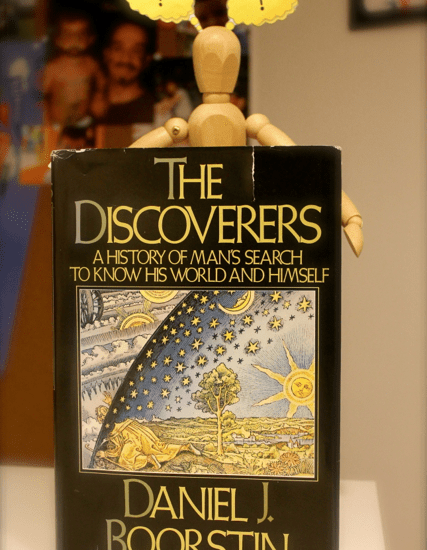The Discoverers – A History of Man’s Search to Know His World and Himself (Book One – Time)

This book is a treasure chest full of memories on how we have gotten where we are today. Learning of the past mistakes and successes helps us avoid present pitfalls and flirt with a brighter future.
The author, Daniel Boorstin – the Librarian of Congress from 1975 to 1987, did an amazing trip through man’s most important discoveries revealing motivations, fortunes, and mishaps behind the most important discoveries and inventions of mankind. The book is huge, and subdivided in 4 books: Time, The Earth and The Seas, Nature, and Society. To make justice to its content, I’ll split this review in 4, and review them as I finish reading.
Time
It wasn’t really an invention or a discovery, but finding ways to understand and measure it was definitely one of the most important steps mankind have taken towards understanding nature and improving its ability to exert control over some of it. Contrary to what one would think, figuring out the best way to measure time and devise mechanisms to keep track of it was one of the most excruciating endeavors mankind have taken and it continues to be subject for discoveries and improvements even today.
Reviving the process of devising methods for tracking the years, seasons, months, days, hours, minutes, and seconds was of vital importance for agriculture, navigation, astronomy, and living in society. We take of those for granted today, but understanding the initial motivations and challenges is a really inspiring process that inevitably drives you to make important parallels on challenges we’re forced to deal with today and where we’re headed to.
Towards the end of this book, it makes an interesting parallel between the time measurement advances of the west (Europe) versus east (Asia, mostly China and Japan). While Europe was well developed in the art of clockmaking, and have even created portable clocks with very good precision using springs, the Asians were lagging far behind, using a far less precise running water based mechanism to track time and avoiding the populace from having access to it. Censorship played a big role there – people were prevented from even studying astronomy, and the trusted scholars allowed to study it were taught to avoid innovations in that area to prevent the understanding so astronomy to become a threat to the empire. Time measurement only found some hope due to the Catholic Church’s missionary work, because priests were trained to tune and maintain their own clocks and during their missions to Asia, they managed to teach them how to develop and keep track of time using the European techniques.
Can’t recommend it enough. Worth every page and time spent, it is a precious pearl to treasure and read.
THE BLOG
News, lessons, and content from our companies and projects.
41% of small businesses that employ people are operated by women.
We’ve been talking to several startups in the past two weeks! This is a curated list of the top 5 based on the analysis made by our models using the data we collected. This is as fresh as ...
Porto Seguro Challenge – 2nd Place Solution
We are pleased to announce that we got second place in the Porto Seguro Challenge, a competition organized by the largest insurance company in Brazil. Porto Seguro challenged us to build an ...
Predicting Reading Level of Texts – A Kaggle NLP Competition
Introduction: One of the main fields of AI is Natural Language Processing and its applications in the real world. Here on Amalgam.ai we are building different models to solve some of the problems ...
Porto Seguro Challenge
Introduction: In the modern world the competition for marketing space is fierce, nowadays every company that wants the slight advantage needs AI to select the best customers and increase the ROI ...
Sales Development Representative
At Exponential Ventures, we’re working to solve big problems with exponential technologies such as Artificial Intelligence, Quantum Computing, Digital Fabrication, Human-Machine ...
Exponential Hiring Process
The hiring process is a fundamental part of any company, it is the first contact of the professional with the culture and a great display of how things work internally. At Exponential Ventures it ...
Exponential Ventures annonce l’acquisition de PyJobs, FrontJobs et RecrutaDev
Fondé en 2017, PyJobs est devenu l’un des sites d’emploi les plus populaires du Brésil pour la communauté Python. Malgré sa croissance agressive au cours de la dernière année, ...
Exponential Ventures announces the acquisition of PyJobs, FrontJobs, and RecrutaDev
Founded in 2017, PyJobs has become one of Brazil’s most popular job boards for the Python community. Despite its aggressive growth in the past year, PyJobs retained its community-oriented ...
Sales Executive
At Exponential Ventures, we’re working to solve big problems with exponential technologies such as Artificial Intelligence, Quantum Computing, Digital Fabrication, Human-Machine ...
What is a Startup Studio?
Spoiler: it is NOT an Incubator or Accelerator I have probably interviewed a few hundred professionals in my career as an Entrepreneur. After breaking the ice, one of the first things I do is ask ...
Social Media
At Exponential Ventures, we’re working to solve big problems with exponential technologies such as Artificial Intelligence, Quantum Computing, Digital Fabrication, Human-Machine ...
Hunting for Unicorns
Everybody loves unicorns, right? But perhaps no one loves them more than tech companies. When hiring for a professional, we have an ideal vision of who we are looking for. A professional with X ...
Stay In The Loop!
Receive updates and news about XNV and our child companies. Don't worry, we don't SPAM. Ever.